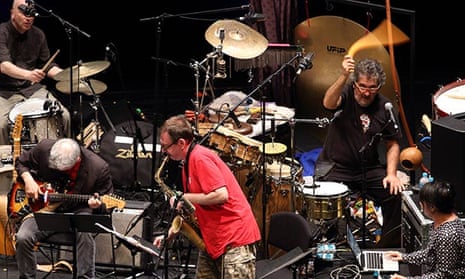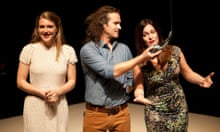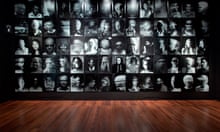If Masada Marathon had been John Zorn’s klezmer project and Classical Marathon had showed the breadth of his, well, classical work, then Triple Bill saw him pushing through the musical pain barrier into the realms of pure noise, especially with the final section, the near-unbearable Cobra. First, however, was Bladerunner, a trio comprising Zorn on saxophone, Bill Laswell on bass and Dave Lombardo, formerly of Slayer, on drums. It spoke volumes about Zorn’s versatility. What other composer would perform with the Adelaide Symphony Orchestra one night and the drummer with the quintessential thrash metal band the next?
Lombardo had flown to Adelaide from California solely to play this 35-minute set, a testament to Zorn’s pulling power, yet the audience – and festival – probably got its money’s worth. His 100mph drumming, especially when aligned with Zorn’s squealing saxophone (thanks to his circular breathing technique, he can hold one note for aeons) was like being strapped to the bottom of a runaway train with your head six inches from the track.
Bladerunner was music as extreme sport – exhilarating, visceral, and almost comical in its intensity. Lombardo surely hits the drums as hard as John Bonham did, but at about ten times the speed. For the final song, Mike Patton was brought onstage to twitch, squat, throat-sing, scream and generally make an unholy racket. The Adelaide festival has played host to a lot of bizarre music this week, but it’s unlikely to see anything quite like that performance ever again.
Fortunately, the second section, Essential Cinema, didn’t attempt to up the ante, but aligned Zorn with New York’s underground filmmakers. The music accompanying Joseph Cornell’s 1936 film Rose Hobart was twangy and torrid, much like the film, with its images of volcanoes and romance in hot climes. The Tin Woodsman’s Dream, a kaleidoscopic montage of dancing women and by Harry Smith, who worked at Disney until the film got him fired, was soundtracked by gongs, organ chords and laptop-generated jungle noises. The third film, Aleph (1966) was a fast-cut anthology of 60s counterculture, from the Rolling Stones to copious female nudity, and Zorn’s band – as with the other films, playing in the dark – soundtracked it with hectic but appealing jazz.
Cobra, the final section, is an improvised piece, in this case played by a 12-piece band, with Zorn stood in the middle directing them with different coloured cue cards which were spread out on a table in front of him. As he picked up different cards and brandished them at the players, they were inspired to even greater heights of distorted screaming and scatting (in the case of Mike Patton), emitting fire-alarm-style shrieks and generally making an unholy din – although Zorn looked displeased at one point, pointing his finger angrily. After umpteen changes in rhythm and time signature, Cobra worked to a conclusion so abrasive and shatteringly loud it was pushing up against the pain barrier – yet the audience gave it a standing ovation, which surely wasn’t just due to relief that it was over. For those listeners with a hardened palate, only Zorn can hit the spot.



Comments (…)
Sign in or create your Guardian account to join the discussion